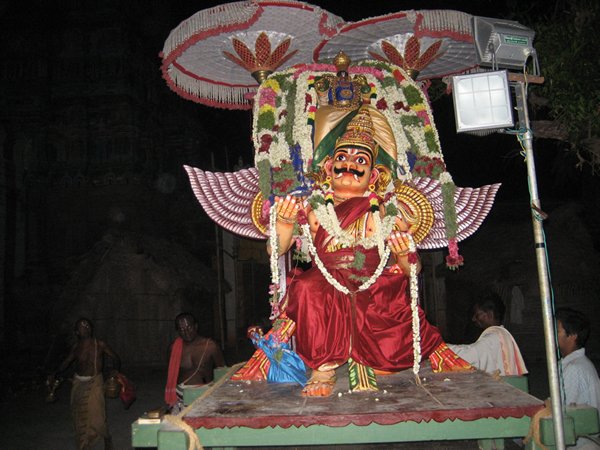sri-bhagavan uvaca
asamsayam maha-baho
mano durnigraham calam
abhyasena tu kaunteya
vairagyena ca grhyate
"Lord Sri Krishna said: O mighty-armed son of Kunti, it is undoubtedly very difficult to curb the restless mind, but it is possible by suitable practice and by detachment."
The Lord says: mahabaho = strong shouldered! Sri Krishna is indirectly ridiculing Arjuna. With his strong shoulders Arjuna could conquer Drona and Bheeshma. But those shoulders are useless to conquer his mind. Asamsayam = no doubt, calam = unsteady, mano = mind, durnigraham = can not be controlled. Sri Krishna replies not by refuting what Arjuna said but agreeing with what all he said about mind. This is called anuvadham, where the petitioner's arguments are answered by agreeing with what he said and then placing the counter arguments. By Sri Krishna agreeing, we can not conclude that one can not control the mind and so yoga is impossible. We have to wait what Sri Krishna further says. Tu = [ though the mind has all these unsteady quality and impedes yoga] but, abhyasena = by exercises, ca = and, vairagyena = by detachment, grhyate = [mind] is controlled. Mind is unsteady, is general rule; but with exception it could be controlled. Abhyasam means exercise or habituating. By diverting the mind from all other matters and training on atman is abhyasam. We have to repeatedly try to divert the mind from all other matters and direct it on atman. Vairagyam means detachment. So by first cutting off our desires on worldly things with determination and then by abhyasam, we direct the mind on atman. This is like training a wild animal. In training a wild animal, we at least know the dangers and so we carefully approach the animal and domesticate it. But in the case of mind, we do not even make any effort or have any intention to control. Unless we are convinced that allowing the mind to drift as it, is fraught with dangers, we will have no intention to control the mind. Knowing the disadvantages of materialistic pleasures like their transient nature, sufferings that accompany, etc., should cause viragyam or detachment with determination. Then it would be easier to train the mind on atman. Just like we throw instantly a drink that contains poison, the moment we come to know the presence of poison, we have to know the poisons in materialistic pleasures and cast them off with firmness. When our mind wanders we have to weigh in balance the pros and cons and if the matter is bad, immediately we have to divert the mind from them. Training the mind on atman also has to be practiced repeatedly. So disciplining the mind can not be termed impossible, but can be disciplined if we are armed with necessary implements or methods. Tireless efforts can be learnt from Anjaneya. Abhyasam can be learnt from the ceaseless services of Lakshmana. Steady behaviour can be seen in Sri Rama. And, mercy can be seen in Sri Sita. So all the Four in the Sri Pattabi Rama sannidhi should bless us in our endeavours. 

No comments:
Post a Comment